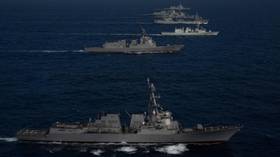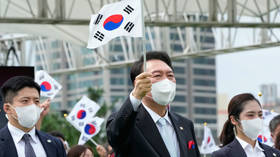US leads war games aimed at North Korea

Japanese and South Korean troops joined US forces for missile defense drills off the coast of Hawaii, the first time the three countries have done so in several years.
The Pentagon said the war games were meant to respond to “challenges” posed by North Korea.
The Pentagon announced the nearly week-long drills on Monday, days after they concluded on August 14, saying the three allies “participated in a missile warning and ballistic missile search and tracking exercise” near the Pacific Missile Range Facility in Hawaii, part of the multinational ‘Pacific Dragon’ drill.
Though the Defense Department offered few other details about the exercises, it claimed they “demonstrated the commitment of the US, [South Korea] and Japan to furthering trilateral cooperation,” bolstering the “rules-based international order,” as well as responding to “DPRK challenges,” using North Korea’s formal name, the Democratic People’s Republic of Korea.
Moreover, Seoul recently confirmed that it would resume joint live-fire drills with the US military later this month, after scaling back those exercises for some time amid vocal objections by Pyongyang and limitations linked to the Covid-19 outbreak.
South Korean missile defenses have also raised concerns in Beijing, which has repeatedly criticized Seoul’s decision in 2016 to host a US-made Terminal High-Altitude Area Defense system (THAAD), arguing it undermines its national security. However, South Korean officials insist they will not allow Beijing to dictate their defense policies, and have rejected calls to refrain from any additional THAAD deployments.
The heightened military cooperation between the US, Japan, and South Korea comes as a number of observers believe Pyongyang is preparing for another nuclear weapons test, which would be its first in several years following a self-imposed moratorium. In late July, after the US and South Korea suggested they would expand a joint military exercise scheduled for later this year, North Korean leader Kim Jong-un announced that Pyongyang’s “nuclear war deterrent” was “fully ready” to respond to threats, further stoking speculation of a possible test in the near future.













